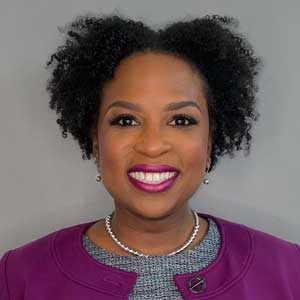Parent leaders bring a reality check to the policy table.
Tawa Jogunosimi has helped CPS, City Colleges of Chicago, and City Hall forge meaningful strategic partnerships with community organizations. COFI is one of the groups that she has been involved with at all three. She served as the former Director of Education Policy and Partnerships in the Office of the Mayor, Chicago.
Just after Arne Duncan was appointed CEO in the summer of 2001, I landed a job in the strategic planning office, working for one of my former professors from graduate school. I worked for her for about a year and a half. Then Arne created an office of after school and community school programs, and I managed the community schools initiative in that office for four and a half years. Then I left for City Hall to work as Mayor Daley’s education assistant for three and a half years.
Mayor Emanuel’s Deputy Chief of Staff for Education brought me back to City Hall to focus on early college—things that fall into the alignment between K-12 and post-secondary options, college, or career.
When I managed the CPS community schools, parent engagement was a key component of the strategy. Each community school program had a lead nonprofit partner. Some of them had specific models for parent and family engagement and some were less focused on it. COFI was hired to work with the lead nonprofits that needed technical assistance in that space.
Before coming back to City Hall, I managed strategic partnerships for City Colleges of Chicago. When I was there, COFI joined something called the Equal Voices Coalition, which was this coalition of community-based organizations that weighed in on different issues. COFI was involved with the jobs and immigration committee. COFI was at a meeting that the City Colleges Chancellor attended and the parent leaders shared their agenda. The chancellor invited them to become a part of the re-invention process.
Equal Voices Coalition wanted to ensure that there was a community voice in the re-invention process. They felt like our community external advisory council really wasn’t community in nature. With a few exceptions, they felt like our community council was populated by people from grasstops rather than grassroots. I guess that was part of their agenda, to ask for a seat at the table. At the meeting, the Chancellor offered them a seat at the table, even though it didn’t yet exist in the structure we were operating in. Key external organizations sat on advisory councils. The heavy lifting was done by full-time employees on task forces. So we found a middle ground between task force membership and advisory council, because they wanted to roll up their sleeves and get in there. We ended up creating a community collaborator process. COFI had a parent on the small working group that was focused on student support.
I appreciated POWER-PAC leader Rosazlia Grillier. She always listened to both the constraints of a bureaucracy such as City Colleges, and what we were trying to accomplish. Rosazlia always seemed to seek a balanced approach to problem-solving, which I appreciated.
At City Colleges, we were known for these 25-page PowerPoint presentations. We were pointing at data. Rosazlia was always the person who would distill it down to how it was going to help parents. The value that she brought was reminding us what all the re-invention was really about. If we produce all these reports and make all these recommendations and nobody understands what we’re talking about, or it’s not really relevant for their daily life, then we haven’t really done anything.
Policymakers and people who have the opportunity to make recommendations are going to affect large numbers of people. There’s often a tendency to make decisions based on what they think will be good for them. But there’s this other side, where people who would be affected might say, ‘I don’t really think that’s going to impact my life that much’ or ‘That seems like a great idea, but it doesn’t change my day-to-day.’ That is the value that Rosazlia brought to those conversations.
For example, the small working group on student supports aligned with a task force focused on the same thing. One of the things that they have really been focused on is creating a system for sharing data between colleges to equip advisors with what they need to help students. Advisors were stretched thin. Before re-invention began, there was, on average, one advisor for every 925 students. The new leadership cut that ratio in half, but it was still high. We were looking for what City Colleges of Chicago Chancellor Cheryl Hyman often called high tech, high touch solutions. We were looking at data systems that would cut down the amount of time advisors spent on mundane, bureaucratic tasks so they would have more time to work with students. So we were focused on making our employees’ lives more efficient.
But Rosazlia wanted to address how long students might have to wait before getting to talk to an advisor or what resources were available to a single parent who needed to complete just a couple classes to graduate but struggled with childcare issues. Rosazlia helped the City Colleges team keep the challenges of average students at the forefront and kept us focused on practical solutions.
That helped me in my role at City Colleges. There was a feedback loop. While there were some real difficult meetings and some hard conversations, there was value and something tangible that came out of each one of those small working groups.
